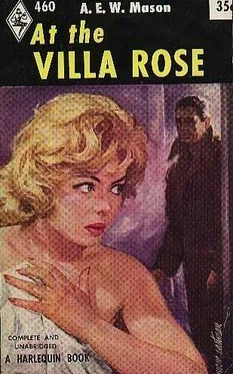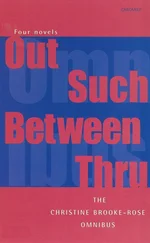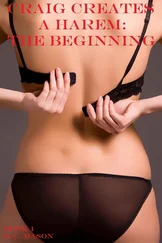A Mason - At the Villa Rose
Здесь есть возможность читать онлайн «A Mason - At the Villa Rose» весь текст электронной книги совершенно бесплатно (целиком полную версию без сокращений). В некоторых случаях можно слушать аудио, скачать через торрент в формате fb2 и присутствует краткое содержание. Год выпуска: 1910, Жанр: Классический детектив, на английском языке. Описание произведения, (предисловие) а так же отзывы посетителей доступны на портале библиотеки ЛибКат.
- Название:At the Villa Rose
- Автор:
- Жанр:
- Год:1910
- ISBN:нет данных
- Рейтинг книги:5 / 5. Голосов: 1
-
Избранное:Добавить в избранное
- Отзывы:
-
Ваша оценка:
- 100
- 1
- 2
- 3
- 4
- 5
At the Villa Rose: краткое содержание, описание и аннотация
Предлагаем к чтению аннотацию, описание, краткое содержание или предисловие (зависит от того, что написал сам автор книги «At the Villa Rose»). Если вы не нашли необходимую информацию о книге — напишите в комментариях, мы постараемся отыскать её.
At the Villa Rose — читать онлайн бесплатно полную книгу (весь текст) целиком
Ниже представлен текст книги, разбитый по страницам. Система сохранения места последней прочитанной страницы, позволяет с удобством читать онлайн бесплатно книгу «At the Villa Rose», без необходимости каждый раз заново искать на чём Вы остановились. Поставьте закладку, и сможете в любой момент перейти на страницу, на которой закончили чтение.
Интервал:
Закладка:
"We have had no such tests as these," Mme. Dauvray explained, half in fear, half in hope.
Adele Rossignol looked the girl over and nodded her head with satisfaction. She had no animosity towards Celia; she had really no feeling of any kind for her or against her. Fortunately she was unaware at this time that Harry Wethermill had been paying his court to her or it would have gone worse with Mlle. Celie before the night was out. Mlle. Celie was just a pawn in a very dangerous game which she happened to be playing, and she had succeeded in engineering her pawn into the desired condition of helplessness. She was content.
"Mademoiselle," she said, with a smile, "you wish me to believe. You have now your opportunity."
Opportunity! And she was helpless. She knew very well that she could never free herself from these cords without Helene’s help. She would fail, miserably and shamefully fail.
"It was madame who wished you to believe," she stammered.
And Adele Rossignol laughed suddenly-a short, loud, harsh laugh, which jarred upon the quiet of the room. It turned Celia’s vague alarm into a definite terror. Some magnetic current brought her grave messages of fear. The air about her seemed to tingle with strange menaces. She looked at Adele. Did they emanate from her? And her terror answered her "Yes." She made her mistake in that. The strong personality in the room was not Adele Rossignol, but Helene Vauquier, who held her like a child in her arms. But she was definitely aware of danger, and too late aware of it. She struggled vainly. From her head to her feet she was powerless. She cried out hysterically to her patron:
"Madame! Madame! There is something-a presence here-some one who means harm! I know it!"
And upon the old woman’s face there came a look, not of alarm, but of extraordinary relief. The genuine, heartfelt cry restored her confidence in Celia.
"Some one-who means harm!" she whispered, trembling with excitement.
"Ah, mademoiselle is already under control," said Helene, using the jargon which she had learnt from Celia’s lips.
Adele Rossignol grinned.
"Yes, la petite is under control," she repeated, with a sneer; and all the elegance of her velvet gown was unable to hide her any longer from Celia’s knowledge. Her grin had betrayed her. She was of the dregs. But Helene Vauquier whispered:
"Keep still, mademoiselle. I shall help you."
Vauquier carried the girl into the recess and placed her upon the stool. With a long cord Adele bound her by the arms and the waist to the pillar, and her ankles she fastened to the rung of the stool, so that they could not touch the ground.
"Thus we shall be sure that when we hear rapping it will be the spirits, and not the heels, which rap," she said. "Yes, I am contented now." And she added, with a smile, "Celie may even have her scarf," and, picking up a white scarf of tulle which Celia had brought down with her, she placed it carelessly round her shoulders.
"Wait!" Helene Vauquier whispered in Celia’s ear.
To the cord about Celia’s waist Adele was fastening a longer line.
"I shall keep my foot on the other end of this," she said, "when the lights are out, and I shall know then if our little one frees herself."
The three women went out of the recess. And the next moment the heavy silk curtains swung across the opening, leaving Celia in darkness. Quickly and noiselessly the poor girl began to twist and work her hands. But she only bruised her wrists. This was to be the last of the seances. But it must succeed! So much of Mme. Dauvray’s happiness, so much of her own, hung upon its success. Let her fail to-night, she would be surely turned from the door. The story of her trickery and her exposure would run through Aix. And she had not told Harry! It would reach his ears from others. He would never forgive her. To face the old, difficult life of poverty and perhaps starvation again, and again alone, would be hard enough; but to face it with Harry Wethermill’s contempt added to its burdens-as the poor girl believed she surely would have to do-no, that would be impossible! Not this time would she turn away from the Seine, because it was so terrible and cold. If she had had the courage to tell him yesterday, he would have forgiven, surely he would! The tears gathered in her eyes and rolled down her cheeks. What would become of her now? She was in pain besides. The cords about her arms and ankles tortured her. And she feared-yes, desperately she feared the effect of the exposure upon Mme. Dauvray. She had been treated as a daughter; now she was in return to rob Mme. Dauvray of the belief which had become the passion of her life.
"Let us take our seats at the table," she heard Mme. Dauvray say. "Helene, you are by the switch of the electric light. Will you turn it off?" And upon that Helene whispered, yet so that the whisper reached to Celia and awakened hope:
"Wait! I will see what she is doing."
The curtains opened, and Helene Vauquier slipped to the girl’s side.
Celia checked her tears. She smiled imploringly, gratefully.
"What shall I do?" asked Helene, in a voice so low that the movement of her mouth rather than the words made the question clear.
Celia raised her head to answer. And then a thing incomprehensible to her happened. As she opened her lips Helene Vauquier swiftly forced a handkerchief in between the girl’s teeth, and lifting the scarf from her shoulders wound it tightly twice across her mouth, binding her lips, and made it fast under the brim of her hat behind her head. Celia tried to scream; she could not utter a sound. She stared at Helene with incredulous, horror-stricken eyes. Helene nodded at her with a cruel grin of satisfaction, and Celia realised, though she did not understand, something of the rancour and the hatred which seethed against her in the heart of the woman whom she had supplanted. Helene Vauquier meant to expose her to-night; Celia had not a doubt of it. That was her explanation of Helene Vauquier’s treachery; and believing that error, she believed yet another-that she had reached the terrible climax of her troubles. She was only at the beginning of them.
"Helene!" cried Mme. Dauvray sharply. "What are you doing?"
The maid instantly slid back into the room.
"Mademoiselle has not moved," she said.
Celia heard the women settle in their chairs about the table.
"Is madame ready?" asked Helene; and then there was the sound of the snap of a switch. In the salon darkness had come.
If only she had not been wearing her gloves, Celia thought, she might possibly have just been able to free her fingers and her supple hands from their bonds. But as it was she was helpless. She could only sit and wait until the audience in the salon grew tired of waiting and came to her. She closed her eyes, pondering if by any chance she could excuse her failure. But her heart sank within her as she thought of Mme. Rossignol’s raillery. No, it was all over for her…
She opened her eyes, and she wondered. It seemed to her that there was more light in the recess than there had been when she closed them. Very likely her eyes were growing used to the darkness. Yet-yet-she ought not to be able to distinguish quite so clearly the white pillar opposite to her. She looked towards the glass doors and understood. The wooden shutters outside the doors were not quite closed. They had been carelessly left unbolted. A chink from lintel to floor let in a grey thread of light. Celia heard the women whispering in the salon, and turned her head to catch the words.
"Do you hear any sound?"
"No."
"Was that a hand which touched me?"
"No."
"We must wait."
And so silence came again, and suddenly there was quite a rush of light into the recess. Celia was startled. She turned her head back again towards the window. The wooden door had swung a little more open. There was a wider chink to let the twilight of that starlit darkness through. And as she looked, the chink slowly broadened and broadened, the door swung slowly back on hinges which were strangely silent. Celia stared at the widening panel of grey light with a vague terror. It was strange that she could hear no whisper of wind in the garden. Why, oh, why was that latticed door opening so noiselessly? Almost she believed that the spirits after all… And suddenly the recess darkened again, and Celia sat with her heart leaping and shivering in her breast. There was something black against the glass doors-a man. He had appeared as silently, as suddenly, as any apparition. He stood blocking out the light, pressing his face against the glass, peering into the room. For a moment the shock of horror stunned her. Then she tore frantically at the cords. All thought of failure, of exposure, of dismissal had fled from her. The three poor women-that was her thought-were sitting unwarned, unsuspecting, defenceless in the pitch-blackness of the salon. A few feet away a man, a thief, was peering in. They were waiting for strange things to happen in the darkness. Strange and terrible things would happen unless she could free herself, unless she could warn them. And she could not. Her struggles were mere efforts to struggle, futile, a shiver from head to foot, and noiseless as a shiver. Adele Rossignol had done her work well and thoroughly. Celia’s arms, her waist, her ankles were pinioned; only the bandage over her mouth seemed to be loosening. Then upon horror, horror was added. The man touched the glass doors, and they swung silently inwards. They, too, had been carelessly left unbolted. The man stepped without a sound over the sill into the room. And, as he stepped, fear for herself drove out for the moment from Celia’s thoughts fear for the three women in the black room. If only he did not see her! She pressed herself against the pillar. He might overlook her, perhaps! His eyes would not be so accustomed to the darkness of the recess as hers. He might pass her unnoticed-if only he did not touch some fold of her dress.
Читать дальшеИнтервал:
Закладка:
Похожие книги на «At the Villa Rose»
Представляем Вашему вниманию похожие книги на «At the Villa Rose» списком для выбора. Мы отобрали схожую по названию и смыслу литературу в надежде предоставить читателям больше вариантов отыскать новые, интересные, ещё непрочитанные произведения.
Обсуждение, отзывы о книге «At the Villa Rose» и просто собственные мнения читателей. Оставьте ваши комментарии, напишите, что Вы думаете о произведении, его смысле или главных героях. Укажите что конкретно понравилось, а что нет, и почему Вы так считаете.












